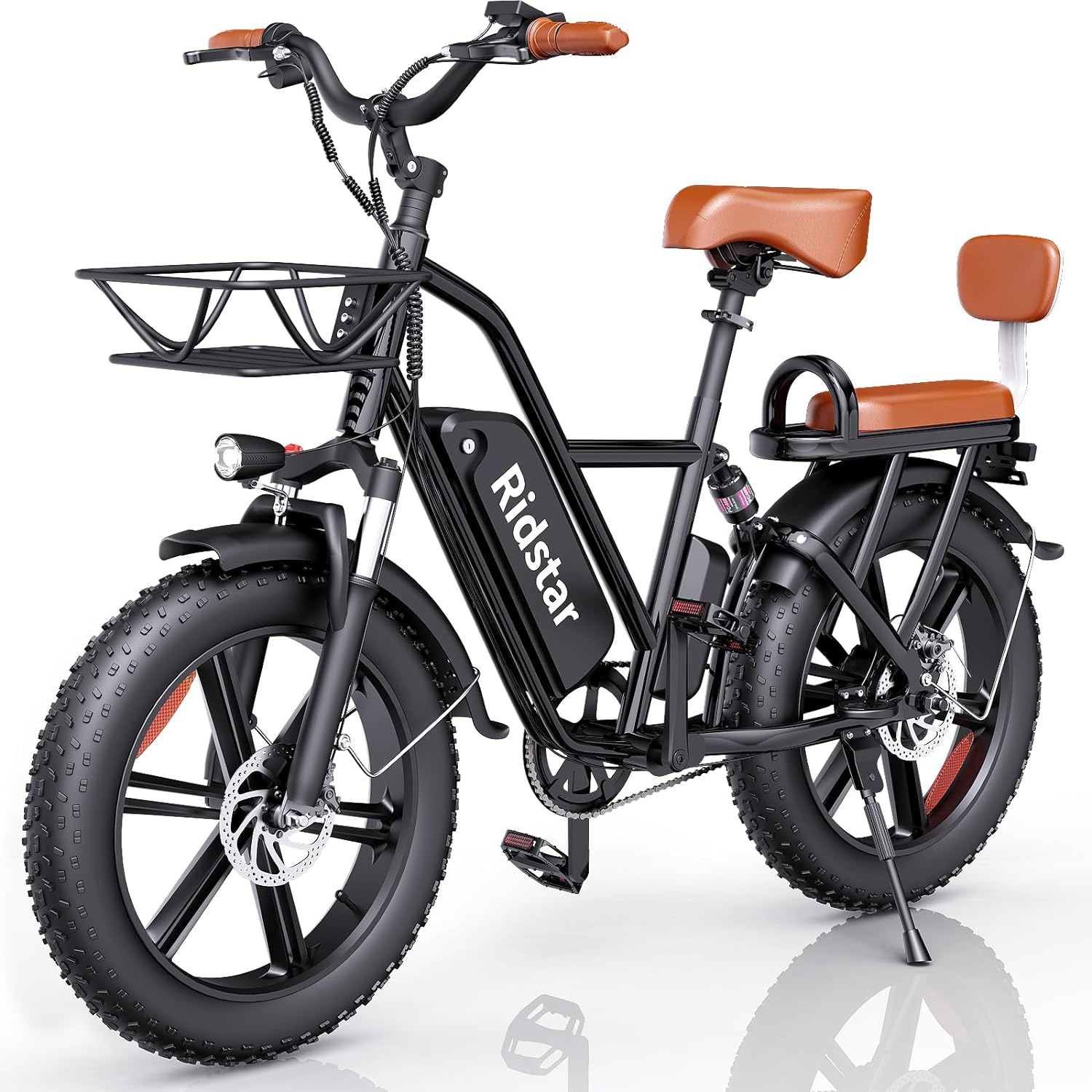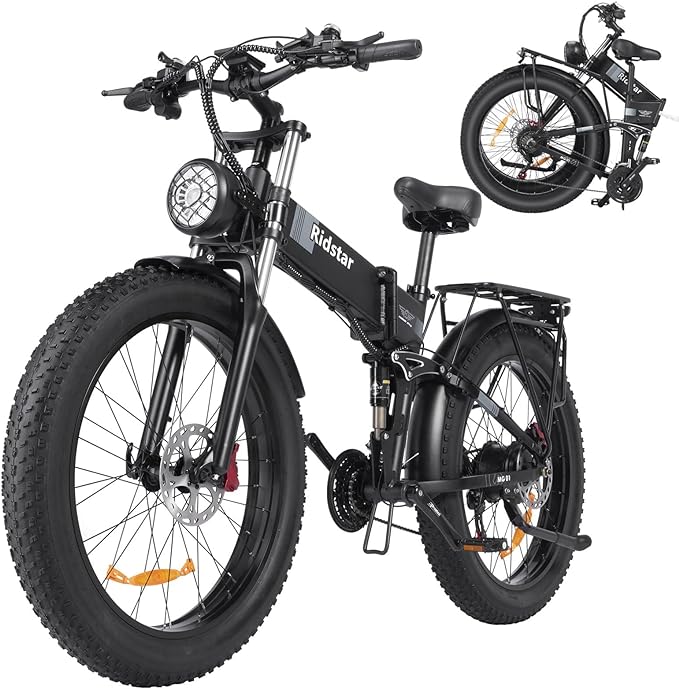Why are folding electric bikes so popular?
Folding e-bikes, or folding electric bicycles, are a type of electric bicycle designed with a unique folding mechanism that allows them to be compacted for easier storage and transport. They combine the benefits of electric bicycles—such as pedal-assist motors and longer ranges—with the practicality of foldable designs, making them ideal for urban commuters, apartment dwellers, and travelers. Here's a comprehensive look at folding electric bikes:
Design and Structure
Folding e-bikes are engineered with a frame that can be folded at one or more points. The most common folding mechanism involves a hinge in the frame, allowing the bike to collapse in half. Some models also feature foldable handlebars and pedals to minimize space. When folded, these bikes can often fit into compact spaces, like car trunks, under office desks, or in tight closets, making them highly versatile.
Electric Components
Folding e-bikes come equipped with electric components that distinguish them from traditional folding bicycles:
Motor: Typically located in the rear hub or mid-drive (crankset), the motor provides pedal-assist or throttle-based power. The wattage of the motor varies, usually ranging from 250 to 750 watts.
Battery: The battery is generally mounted on the frame or integrated into the seat post. It powers the motor and can be removable for charging or swapping.
Controller: This component regulates the power output from the battery to the motor.
Display: Many folding e-bikes have a display or control panel on the handlebars that shows information like speed, battery level, distance traveled, and pedal-assist levels.
What are the pros and cons of folding ebikes?
Here's an in-depth exploration of the pros and cons of folding e-bikes:
Pros:
Portability and Convenience: Perhaps the most significant advantage of folding e-bikes is their portability and convenience. These bikes are designed to fold down into a compact size, making them easy to transport and store in various settings. Whether you're commuting to work, traveling on public transportation, or exploring new destinations, the ability to fold and carry your e-bike with you adds an extra level of convenience to your journey.
Versatility and Multi-Modal Transportation: Folding e-bikes are incredibly versatile and well-suited for multi-modal transportation. Commuters can ride their e-bikes to the train station or bus stop, fold them up, and easily bring them on board for the remainder of their journey. This seamless transition between cycling and other modes of transit makes folding e-bikes an efficient last-mile solution, bridging the gap between public transportation hubs and final destinations.
Practicality and Space-Saving Design: In today's urban environments, space is at a premium. Folding e-bikes offer a practical solution to the problem of limited space, thanks to their compact and space-saving design. When folded, these bikes take up minimal space, making them suitable for storage in small apartments, offices, or even under desks. This space-saving feature not only makes folding e-bikes more convenient for urban dwellers but also enhances their appeal to individuals with limited storage options.
Technological Advancements: Advancements in electric bike technology have significantly enhanced the performance and capabilities of folding e-bikes. Today's e-bikes are equipped with lightweight, efficient motors and high-capacity batteries that deliver impressive performance and range. Riders can enjoy smooth acceleration, higher speeds, and extended battery life, making their commutes more enjoyable and efficient. Additionally, some folding e-bikes come with smart features such as Bluetooth connectivity, GPS tracking, and smartphone integration, enhancing the overall riding experience.
Environmental Benefits: Folding e-bikes offer an eco-friendly alternative to cars and motorcycles, helping to reduce carbon emissions and air pollution. By choosing to ride a folding e-bike instead of driving, individuals can contribute to a cleaner and more sustainable environment while enjoying the health benefits of cycling. Additionally, folding e-bikes promote a more active lifestyle by encouraging riders to pedal and engage in physical activity, further enhancing their appeal to environmentally conscious consumers.
Health and Fitness: Riding a folding e-bike can also have significant health and fitness benefits. While the electric motor provides assistance with pedaling, riders still engage their muscles and cardiovascular system, resulting in a low-impact form of exercise. Regular cycling can improve cardiovascular health, strengthen muscles, and help maintain a healthy weight. Folding e-bikes make it easier for individuals of all fitness levels to incorporate cycling into their daily routines, whether it's for commuting, leisure, or exercise.
Cons:
Cost: One of the main drawbacks of folding e-bikes is their relatively high cost compared to traditional bicycles. The addition of an electric motor and battery system increases the price of these bikes, making them a significant investment for some individuals. However, it's essential to consider the long-term savings on fuel and maintenance costs, as well as the potential health benefits of regular cycling, when evaluating the overall value of a folding e-bike.
Weight: While folding e-bikes are designed to be portable, they can still be heavier than traditional bicycles due to the added weight of the electric motor and battery. This can make them more challenging to carry for extended periods or navigate up stairs. However, advancements in battery and motor technology have led to lighter and more compact designs, mitigating this issue to some extent.
Limited Range: Although modern folding e-bikes offer impressive battery life and range, they still have limitations compared to traditional bicycles. Depending on factors such as terrain, rider weight, and assist level, the battery may need to be recharged more frequently, especially on longer rides. While most folding e-bikes are equipped with removable batteries for easy charging, riders may need to plan their routes and charging stops accordingly.
Maintenance and Repairs: Like any other mode of transportation, folding e-bikes require regular maintenance and occasional repairs to ensure optimal performance and safety. The electric components, such as the motor and battery, may require specialized servicing, which can be more costly and challenging to find compared to traditional bicycle components. Additionally, the folding mechanism and other moving parts may be prone to wear and tear over time, requiring periodic adjustments or replacements.
Limited Performance: While folding e-bikes offer significant advantages in terms of convenience and portability, they may not match the performance capabilities of traditional bicycles or full-size e-bikes. The compact frame and smaller wheels of folding e-bikes can affect stability and handling, especially at higher speeds or on rough terrain. Additionally, the electric assist may not be as powerful as larger e-bike models, limiting their suitability for more demanding cycling scenarios.
Regulatory Restrictions: In some regions, there may be regulatory restrictions or limitations on the use of electric bicycles, including folding e-bikes. These regulations may dictate where e-bikes can be ridden, maximum speed limits, and licensing requirements for riders. It's essential for individuals considering the purchase of a folding e-bike to familiarize themselves with local laws and regulations to ensure compliance and avoid potential fines or penalties.
Folding e-bikes offer a range of advantages, including portability, convenience, versatility, technological advancements, environmental benefits, and health and fitness benefits. However, they also come with some drawbacks, such as cost, weight, limited range, maintenance and repair requirements, performance limitations, and regulatory restrictions. Ultimately, the decision to invest in a folding e-bike will depend on individual preferences, needs, and circumstances.
When choosing a folding e-bike, several factors should be considered to ensure the best fit for your needs:
Folding Mechanism: Look for a sturdy and easy-to-use folding system. Some designs are more complex but offer better durability and stability when riding.
Battery Life: Consider the battery capacity and the expected range. A longer range may be beneficial if you plan to use the e-bike for longer commutes or recreational rides.
Weight: While folding e-bikes are generally lighter than regular e-bikes, they can still be heavy. A lighter model might be preferable if you need to carry the bike frequently.
Build Quality: The frame and components should be robust and reliable to ensure safety and longevity.
Price: Folding e-bikes can vary widely in price. Set a budget and consider factors like motor power, battery capacity, and additional features to find the best value.
In conclusion, the popularity of folding electric bikes can be attributed to their convenience, versatility, practicality, technological advancements, environmental benefits, and alignment with urbanization and mobility trends. As more people seek efficient, sustainable, and flexible transportation solutions, folding e-bikes are likely to remain a popular choice for urban commuters, outdoor enthusiasts, and environmentally conscious consumers alike. Whether you're looking to simplify your daily commute, explore new destinations, or reduce your carbon footprint, a folding e-bike offers a convenient and eco-friendly way to travel.



